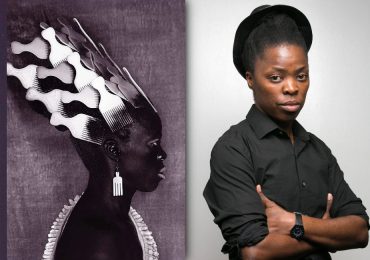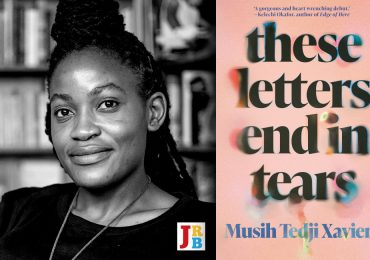The JRB presents a new short story by Zanta Nkumane.
Mad About the Boy
He comes to me one night, draped in his glowing skin, resolute eyes and imposing voice. Come home with me? he asks, after spending the night wooing me, his largeness sequestering us in the corner of the bar for countless hours. He is beautiful. It’s always the beautiful ones. They are the ones that peel us away from the humdrum of our safe lives and reintroduce us to the risky, smouldering parts of ourselves we have cremated. Without thinking about it too long, I say Yes. I say yes because the loneliness tells me to. I say yes because I have recently been left and had to leave my home because he found someone whose hands touch him more thoughtfully. I say yes because we all promise to try new things after leaving. I say yes because a beautiful boy thinks me worthy to take home. I say yes because he says I am unlike other boys. I clasp my hand to his and allow him to lead me, wherever. I notice his desperate, choking grasp, as if he believes I will change my mind and run back to my friends.
I don’t run back; I go with him.
I should have run.
There was no escaping The Beautiful Boy, he was vast in beauty and persona. Seeing him under the light of his lamp, his face carving a perfect half moon into the pillow, from which his eyes look up at me, I wanted to be subsumed by him. In every sense of the word. But he promised we wouldn’t do anything that first night, he just wanted to be near my measured warmth. He only asked to hold me. I always found cuddling more intimate than sex anyways. The word cuddling has a certain haste about it that belies the simmering intimacy of the act. Bodies snaked within, above and across each other throughout the night is how bodies truly learn each other. Caving into each other then sprawling away, but remaining in touch. Again he clutched at me, with the desperation of one who has been left before. I knew that emotion well, and so I allowed his abandonment to hold mine that night.
*
My grandfather had three wives, a pile of children and us, his ever-burgeoning grandchildren. Every school holiday, we descended on his farm with the same vigour as the Gadarene pigs that threw themselves over a cliff to avoid possession by demons. If you asked our grandparents, they would have agreed that some days they thought us possessed. We were explorers during this time, trekking the same hills and rivers our forefathers did. Here, fun was beyond television. My cousins and I were always up early, often around the time night swapped shifts with the light, to allow the cows out from the kraal to graze and roam. My favourite days were the scorching days, when the sun burnt a brutal yellow on us. The temperatures sauntering past thirty degrees by midday. We would spend hours at the river, sinking our tiny naked brown bodies into its cooling waters. My cousins would compete for the title of ‘best diver’ by jumping off the promontory over and over again. Their joyful shrieks and competitive derision sliced through the air as they flung themselves into the water, twisting into contortions in midair.
I never dived; I was too careful a child. When we were tired, we lay on the rocks to dry off, our banter brimming with dreams of the future, which Power Ranger we wanted to be, how my cousin recently discovered ‘blue movie’ video tapes stashed in our uncle’s wardrobe. The outcrop of rocks was like a densely planted garden of bulbous greys and blacks, millions of years in the making. We were but tiny brown blemishes against those colossal rocks, scarred by the path of the river. My cousins endeavoured to teach me the dah-dam because I had been dubbed the cheese-boy of the family, for my private school education and city living—via my aunt’s generosity, and pity. The dah-dam is a swimming style that I can only describe as a much louder, unrefined freestyle. Your hands stay in the water, clambering the way a dog would. To propel yourself forward, you must kick your legs from an erect starting position above the water. Your legs fall to create a loud booming dah-dam when they impale the water. Dah-dam. The sound of my childhood. It was a simple process, but it took me many tries to master. To stay afloat. I would return to my friends back home, excited to teach them the dah-dam in sparkly, chlorinated Joburg pools. They laughed, calling it stupid and too much of everything—too splashy, too noisy, too uncouth. I never did it again. It wasn’t the same away from a river anyways.
One of those afternoons, we forgot to check on the herd of cows, which was grazing not too far from us. While gathering the livestock, we realised a calf was missing. It was yet to be named. My grandfather named all his cows. He said naming gave the animal purpose, and even if that purpose was to end up in the slaughterhouse, the name determined how tender the meat would be. We split into small search parties. After a few hours, one of my cousins found the calf. As she whistled we hurried to where she was. Her whistle was frantic, unmusical, hard on the ear—we knew something had happened.
Blood.
The blood, it was everywhere. Sinking into the soil onto which it had been poured. Plastered on the green of the shrubs and grass. The calf was merely debris now, a carcass of a life that could have been. A tender steak on someone’s plate he would never be, he would live raw in the bellies of canids. All that remained were his eyes, and they mocked us with the quiet knowledge of what we didn’t yet know—death.
I remembered that calf the first time The Beautiful Boy beat me.
I wondered how it had felt as those jackals tore into him. Was he just as staggered? I wondered how it felt when those first sharp incisors pierced his young brown hide. Did he wail, or softly surrender, his softness a rebellion, denying those wildlings the satisfaction the fight nature commands? A gentle death, a fuck you to the circle of life? I believe that calf felt as I did the first time The Beautiful Boy hit me.
I, too, took the beating silently.
Afterwards, I locked myself in the bathroom. I ran a bath. Like Esther Greenwood, I believed hot baths to be holy. And like her, I believed the water had to be scalding to be effective. You feel both alive and dead in a hot bath, akin to the protective chamber of your mother’s womb. I stayed in there for hours, drawing out the water to add more hot as it cooled. Hoping that every fresh, hot batch of water would dissolve the violence I had just experienced. I also stayed in there because an unbridled fear of the man I loved gripped me and anchored me to that tomb of a tub. When I finally emerged I wiped the mist off the mirror to examine my face. It wasn’t my eyes I saw, it was that calf’s eyes, reflecting back at me. I didn’t want to go unnamed, as he had. The swelling was deeper than the mounds on my face and the soreness of my body. I slept in the guest bedroom that night.
Knock. A whimpering apology. Knock. A Don’t leave me. Knock. An I love you. Knock.
I heard his footsteps trudge away. I exhaled; I hadn’t even realised I had stopped breathing.
Walking down the stairs the morning after, I knew that if I didn’t leave him that day, I would never leave. I found him waiting for me, a bouquet of flowers on the kitchen counter. Sunflowers—he knew I adored their bright disposition, but that day I found their optimism offensive. I was furious with him for involving my favourite flowers in his apology.
I’m so sorry for what happened last night, he said, walking around the counter towards me. For a moment I envisioned him walking into a knife. I instinctively moved back. What happened? You beat me damn near to death and a happening is all you can call it? I responded. A rage moulded itself to my throat. Look at me, name it, I demanded, my voice matching the mounting anger.
I am sorry I hit you, it was something completely awful and terrible, he says. I will spend the rest of my life making it up to you. I promise. Just please don’t leave me. Please.
He held me in that kitchen as tears scalded my face. Please don’t ask me why, but I decided to try and make it work with him. Whatever making it work means. I had read somewhere that love is a decision, not a feeling that falls from the sky to find refuge at the base of your heart. The feeling that unleashed insanity in us was no myth, no metaphysical manna. It was a choice we made. Besides, I knew being alone was something I didn’t do very well. Neither did he. So I stayed.
*
Keeping the peace is absurd when there is no peace left to gather. The Beautiful Boy never stopped his beatings. The only touch I knew then was the hard curvature of his knuckles on my face. Each punch was a bloody reminder of the impermanence of my body. I wanted to leave, but he had expanded into parts of me. He beat the option of freedom out of me. I was in love with a monster. How do you run from a monster that reminds you of yourself? You don’t. You stay and hope that your love is wide enough to gather the best parts of him back.
The Beautiful Boy became my god, despotically deciding how my time should be spent and with who, calling incessantly if I was away from him.
At times, the punches were torrential and thunderous. I had learnt to protect my face by covering it with my arms—it minimised the damage and meant fewer explanations. You may be wondering why I didn’t fight back. I did try a few times. But when I fought back, the beating lasted longer than my body could endure. So I stopped.
Until one day I decided that if The Beautiful Boy hurt me again, I’d hurt him back.
*
When he begins his litany of apologies the morning after another episode of barbarity, I hush him. There is usually a material offering that accompanies his words. It’s a routine, an ugly waltz. We spin endlessly in our codependent dance until something, or someone, yanks us out. This time, he says, he is taking me out on a hot air balloon ride. Lame, I think. Cool, I say. Be ready in ten, he says, as he returns his attention to his laptop on the counter.
I head upstairs. I shoot straight for our bed. Between the mattress and base, I feel for its small, deadly coldness. It’s still there. This was the only safe place to keep it in the house. I draw strength from its steel edges. I will not falter, I will keep him happy today so that his sleep is undisturbed and deep. This is the last day. I feel powerful. ‘No one knows about that day or hour, not even the angels.’ But I do.
The last day is bright and blue. The greens and browns fit dreamily into the frame of the car window, like a painting I used to know. He is beautiful still. The lustre of his orange shirt complements the scene, as if he has coordinated with Mother Nature herself. Our loud singing is interrupted by him laying his hands on me with a tenderness I forgot he was capable of. Maybe these morsels of kindness had kept me here, but now they don’t mean anything.
It is too late.
In the hot air balloon, the land stretches under us in all its bigness and smallness as we float into the sky. He kisses my forehead, whispering, I’m sorry, I love you. My nerves keep stabbing at me, reminding me what needs to happen this evening. His sweet nothings are exactly that; I am impervious. I remember the comforting, cold steel and smile coyly up at him. I love you too, I respond. Let’s just enjoy this moment, I add, and we settle into a familiar silence. I place my head on his chest, inhale him for the last time. The ride is over sooner than I expect, and we descend back to the ground. Back to the end.
For the rest of the day, I perform the doting lover as best as I can. We cook and drink wine. I make sure he consumes more than I.
The moment comes. I half carry him to bed. Midway up the stairs, he stops to look at me. You know I love you, right? I hope you always remember me as the man that took you home that night, he slurs. I know, baby, I soothe. Let’s get you into bed. He places a kiss on my forehead. An unacknowledged goodbye.
I do not fall asleep. I wait a good two hours before I make any movement. He snores into my ear. I get up and ease it as quietly as I can from under the mattress. It is heavy for such a compact thing. I look at him while he sleeps. I inhale my last free breath, and return to lie next to him.
I am the calf now.
The last thing I remember is the searing cold of the barrel in my mouth. My teeth clunking against the silver hardness. That frigid taste ends me before the bullet does.
My blood stains our bed; it flows out of my body like a river. The Beautiful Boy falls apart trying to save me. But I am already gone. The Beautiful Boy cannot leave me, ever. He will see my eyes in the darkness.
- Zanta Nkumane is a writer, journalist and ex-scientist. Follow him on Twitter.






What an amazing story… YOU are such a talented writer.
Wow, this is so beautiful beyond words wow. Such a powerful amazing story imagery is so vivid love love love it.
I love it. ?
This is such a beautiful piece, the suspense is mind blowing. I love it.
Oh my goodness Zee! This is so brilliantly written, wooow.
The suspense, the imagery.. I felt everything. This is amazing work.
Such a beautiful piece of writing… sooo intense yet so gently narrated. Loved every bit of it
a beautiful piece of writing. I just finished reading it and all I can say is, hmm.
I really enjoyed this.
This was beautifully written. I loved this.